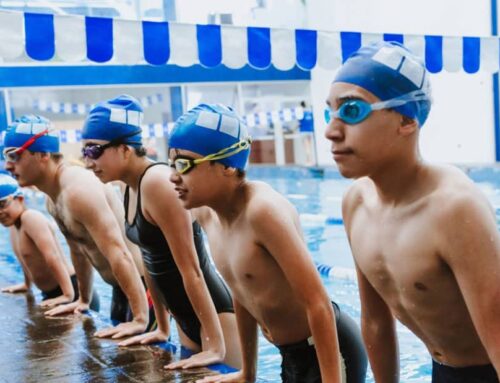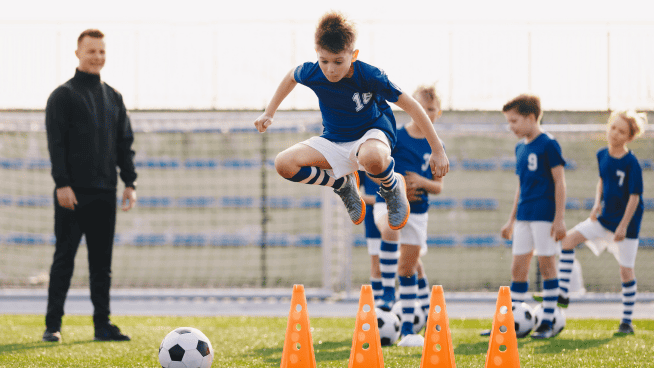How To Become A Better Sports Parent
Let’s be clear with two “items” about the adult roles with youth team sports:
A: As a parent, you are not the team coach. So at game matches and practices, don’t act like one! Don’t upstage the coach and diminish their credibility with team members.
B: Your conduct as a parent during team matches is a reflection of the team’s character. If you “mouth off” like an idiot with unfiltered provoking and mean-spirited comments, shouting matches can become violent.
Such violence nearly happened during a recent ice hockey match: a Brooklyn NYC team versus a high school team from Bergen County, NJ.
The score grew from 5-0 to 10-0 by the end. Whether the Brooklyn coach had evoked his version of “mercy rule” by playing his second and third lines more at the time was not clear.
With each additional goal scored, that home bench exploded in celebration as if it was a tournament winner. Inappropriate. Why? It provoked the crowd of friends and parents at this home rink to become very vocal and derisive toward the losing team in an otherwise decent game. There were excellent levels of play from both teams, and only the narrow factor of puck possession made the difference in scoring opportunities. The goalie who had ten goals against actually made some remarkable saves along the way to the severe loss.
If it hadn’t been for some knowledgeable hockey friends (and myself) in the viewer stands to step in to quell the home crowd down, there would have been at least one fistfight from one angry New Jersey father–who expressed that the over-celebration was not in good spirits with the intent of youth sports. He was correct with that. We kept them separate from the visiting parents. Luckily, local police calls were avoided through some open discussion as vocally supportive of the defeated team. All they wanted to hear in the loss was the expression of “good game” and “good action” which would go with the lines exchanging handshakes at the end of the match. That notable hockey tradition didn’t happen after the final buzzer. It was simply because of the excessively rowdy group of winning home team parents.
And so here are a few “pointers” on how parents can be a more positive force at the games and the practices.
There is no definitive answer on being “the best” sports parent. However, the following list of eleven pointers can serve as a reference reminder to newer parents who want their child(ren) to 1) realize their full capability, and 2) promote their love interest in a particular sport. That interest arguably should be the child’s interest, not necessarily your interest.
It is OK to introduce your youngster to any sports that you happen to love, but if they try it and don’t have any playing passion, then still let them pick their sport. For example, you might be disinterested in soccer, but your child loves kicking the ball around. Be supportive! Years later, no matter how far the child progresses in that sport, they’ll still be appreciative of the time you spent to take them (and possibly their friends, too) to practices and game matches.
So, here is a list of hopefully-helpful pointers, in no particular order:
10 Ways To Be A Better Sports Parent
1: Communication
Communicate with other parents, as you do with the coach. Each parent of the team members has the mutual objective of enjoying the “team experience” with all the wins & losses–and even the chance to become competitive league champions. These early experiences are key “shapers” of the lives of almost every child who plays on a team. You can become a key contributor in the camaraderie of the team spirit.
2: Help
Offer to help. Here are two possibilities: offer to be the videographer or a rideshare/carpool for other parents who may not have vehicular transportation. And if you do such good deeds, don’t expect reciprocity. Do such deeds for the good of the team. Life has a way of bringing about rewards that may not even be related to such generosity, in what some call “positive karma.” You’ll be able to feel the appreciation!
3: Educate Yourself
Learn the rules of the sport. Even if it is not YOUR favorite sport, it might be the favorite of your son or daughter who places considerable value on their team members. You might even use this learning model to become more quality time with your child, i.e., by discussing those unusual gameplay situations which require a look at the governing rule or regulation.
4: You Aren’t The Coach
Don’t upstage the coach. If you are vocal/critical, consider becoming the coach or an assistant coach. But in your perspective, as a parent, be aware that you are one of many in the team’s “family.” If you critique everything, the coach might distance themselves from all parents instead of staying connected. Be positive in any commentary about the coach so that you are not creating a “mutiny mode” among parents. Discuss any issues or potential issues directly and openly (with other parents present).
5: At home: support proper nutrition!
Sugary soda and snack forms are laden with refined sugar, excessive salt, and saturated fats can undo the merits of the physical workout and even create medical challenges such as a pre-diabetic condition and cardiovascular inefficiencies even in younger bodies. Other STACK articles have addressed this challenge for further reading.
6: SLEEP
Remind your young athlete about rest/sleep requirements!
Ask the relevant question: How do the pros do it, with their rigorous on-schedule season, involving a lot of travel to their “away” games?
They rest beforehand. Whether it is sleep, a catnap, or a quiet meditation for a time, such rest does help prevent injuries from playing in an exhausted state. It is addressed further in item # 11.
7: Stretch
Expect those fitness exercises/stretches from your young athlete to prevent on-field injuries. You might even perform these exercises at home with your child for your physical fitness. Again, this is a form of positive-example setting. Positive encouragement works much better than any negative critiques that could even create an inner hostility. A needless consequence in meeting the challenges of physical development and athletic ability.
8: Positive Feedback
Communicate with your loved ones about their positive plays, and compliment their friends. It is tempting to fall into the negativity heard too often. Even where the on-field blunder is obvious, no one knows it better than the individual who committed the error at any age. So try to express encouragement, and never a negative word which would dishearten anyone–especially a more impressionable child athlete.
9: No Drinking or Drugs
Remind the adolescent athletes: no alcohol. There is no set strategy on this one. But try to make it clear that the ill effects heavily outweigh any temporary euphoria. Peer pressure can often enough lead to wrecked bodies in wrecked automobiles. Health Educators across the nation try their darndest to build refusal skills in those who have tendencies to be adventurous or daring or want to “fit in” with a group. As a parent, if you can set the positive example of never getting drunk, that would become a strong influence, even for their friends who might see you as a positive adult example.
10: Your Athlete Isn’t Going Pro
Understand the odds of the pro contract, but don’t burst the bubble, because as they say in Lotto, “You Never Know.” Some brief examples:
This author missed a chance of being asked to play for the Junior Canadiens in the Henri Richard Hockey School. A nephew did play professional soccer in Arizona for two years. Two young friends-of-friends are presently playing ice hockey in the NHL, having skated with them on brief separate occasions.
Odds Of Getting Into Professional Sports
During a lengthy coaching certification course (for earning an NYC certification), the curriculum included the approximate “odds” of a young athlete reaching the professional leagues in the following popular team sports.
These numbers were based on the league team registrations as kept by the national organizations behind each sport, not the professional leagues per se.
- Baseball: One in 2.5 million
- Basketball: one in 1.1 million
- Football: one in 1.5 million
- Hockey: one in 145,000–because less organized hockey is played (per capita) in the US than in other countries.
These Lottery-like stats are not for waving in front of your child, or they might immediately lose interest in ever playing again.
Every pro athlete who made it had:
- Degree of desire to progress
- A lot of self-discipline
- Love of the sport–all with4) keeping their school grades up.
You can tell your child those four factors if they ever ask “What does it take for me to go all the way to reach the pros ?”
Especially these days, it is not unfair to emphasize not letting school grades slip. Colleges are becoming the proving grounds for all of these sports, if not already (as with football and basketball).
11: Support
A word about off-hours / travel games/practices: how to support the effort. Whether those off-hours practices/games are previously scheduled or from unexpected schedule changes, it is hoped that the team coach is on top of letting parents know. You might have to help in that aspect if last-minute changes are avoidable by more in-advance alerts. Very-early morning or late-night practices are not beneficial in a normal circadian rhythm, i.e., a 24-hour human cycle. So without calling it doing “damage control” for your team members, the enjoyment of the very late night practice or game is going to come with a price.
If you think you are tired from driving them, imagine how tired you would be if you were in the event! So while your sleep or work time is impacted, theirs is also. Physical expenditure is always going to require a period of rest. It is more than the lactic acid build-up in the athlete’s muscle tissue. Those athletic workouts are an entire metabolic shift from resting state to a form of “overdrive.” It’s what we as young kids had called “adrenaline rushes.” This reminder goes back to point #6 of this article: rest/ sleep / “catnap” before these events, if possible.
Conclusion
In conclusion, if you can share the enjoyment of this family experience of getting out and taking photographs of the wins or even the losses, this parental support of your child (as a team athlete) creates a strong bond with them. Such bonds can extend into other life experiences to benefit such children.
RECOMMENDED FOR YOU
MOST POPULAR
How To Become A Better Sports Parent
Let’s be clear with two “items” about the adult roles with youth team sports:
A: As a parent, you are not the team coach. So at game matches and practices, don’t act like one! Don’t upstage the coach and diminish their credibility with team members.
B: Your conduct as a parent during team matches is a reflection of the team’s character. If you “mouth off” like an idiot with unfiltered provoking and mean-spirited comments, shouting matches can become violent.
Such violence nearly happened during a recent ice hockey match: a Brooklyn NYC team versus a high school team from Bergen County, NJ.
The score grew from 5-0 to 10-0 by the end. Whether the Brooklyn coach had evoked his version of “mercy rule” by playing his second and third lines more at the time was not clear.
With each additional goal scored, that home bench exploded in celebration as if it was a tournament winner. Inappropriate. Why? It provoked the crowd of friends and parents at this home rink to become very vocal and derisive toward the losing team in an otherwise decent game. There were excellent levels of play from both teams, and only the narrow factor of puck possession made the difference in scoring opportunities. The goalie who had ten goals against actually made some remarkable saves along the way to the severe loss.
If it hadn’t been for some knowledgeable hockey friends (and myself) in the viewer stands to step in to quell the home crowd down, there would have been at least one fistfight from one angry New Jersey father–who expressed that the over-celebration was not in good spirits with the intent of youth sports. He was correct with that. We kept them separate from the visiting parents. Luckily, local police calls were avoided through some open discussion as vocally supportive of the defeated team. All they wanted to hear in the loss was the expression of “good game” and “good action” which would go with the lines exchanging handshakes at the end of the match. That notable hockey tradition didn’t happen after the final buzzer. It was simply because of the excessively rowdy group of winning home team parents.
And so here are a few “pointers” on how parents can be a more positive force at the games and the practices.
There is no definitive answer on being “the best” sports parent. However, the following list of eleven pointers can serve as a reference reminder to newer parents who want their child(ren) to 1) realize their full capability, and 2) promote their love interest in a particular sport. That interest arguably should be the child’s interest, not necessarily your interest.
It is OK to introduce your youngster to any sports that you happen to love, but if they try it and don’t have any playing passion, then still let them pick their sport. For example, you might be disinterested in soccer, but your child loves kicking the ball around. Be supportive! Years later, no matter how far the child progresses in that sport, they’ll still be appreciative of the time you spent to take them (and possibly their friends, too) to practices and game matches.
So, here is a list of hopefully-helpful pointers, in no particular order:
10 Ways To Be A Better Sports Parent
1: Communication
Communicate with other parents, as you do with the coach. Each parent of the team members has the mutual objective of enjoying the “team experience” with all the wins & losses–and even the chance to become competitive league champions. These early experiences are key “shapers” of the lives of almost every child who plays on a team. You can become a key contributor in the camaraderie of the team spirit.
2: Help
Offer to help. Here are two possibilities: offer to be the videographer or a rideshare/carpool for other parents who may not have vehicular transportation. And if you do such good deeds, don’t expect reciprocity. Do such deeds for the good of the team. Life has a way of bringing about rewards that may not even be related to such generosity, in what some call “positive karma.” You’ll be able to feel the appreciation!
3: Educate Yourself
Learn the rules of the sport. Even if it is not YOUR favorite sport, it might be the favorite of your son or daughter who places considerable value on their team members. You might even use this learning model to become more quality time with your child, i.e., by discussing those unusual gameplay situations which require a look at the governing rule or regulation.
4: You Aren’t The Coach
Don’t upstage the coach. If you are vocal/critical, consider becoming the coach or an assistant coach. But in your perspective, as a parent, be aware that you are one of many in the team’s “family.” If you critique everything, the coach might distance themselves from all parents instead of staying connected. Be positive in any commentary about the coach so that you are not creating a “mutiny mode” among parents. Discuss any issues or potential issues directly and openly (with other parents present).
5: At home: support proper nutrition!
Sugary soda and snack forms are laden with refined sugar, excessive salt, and saturated fats can undo the merits of the physical workout and even create medical challenges such as a pre-diabetic condition and cardiovascular inefficiencies even in younger bodies. Other STACK articles have addressed this challenge for further reading.
6: SLEEP
Remind your young athlete about rest/sleep requirements!
Ask the relevant question: How do the pros do it, with their rigorous on-schedule season, involving a lot of travel to their “away” games?
They rest beforehand. Whether it is sleep, a catnap, or a quiet meditation for a time, such rest does help prevent injuries from playing in an exhausted state. It is addressed further in item # 11.
7: Stretch
Expect those fitness exercises/stretches from your young athlete to prevent on-field injuries. You might even perform these exercises at home with your child for your physical fitness. Again, this is a form of positive-example setting. Positive encouragement works much better than any negative critiques that could even create an inner hostility. A needless consequence in meeting the challenges of physical development and athletic ability.
8: Positive Feedback
Communicate with your loved ones about their positive plays, and compliment their friends. It is tempting to fall into the negativity heard too often. Even where the on-field blunder is obvious, no one knows it better than the individual who committed the error at any age. So try to express encouragement, and never a negative word which would dishearten anyone–especially a more impressionable child athlete.
9: No Drinking or Drugs
Remind the adolescent athletes: no alcohol. There is no set strategy on this one. But try to make it clear that the ill effects heavily outweigh any temporary euphoria. Peer pressure can often enough lead to wrecked bodies in wrecked automobiles. Health Educators across the nation try their darndest to build refusal skills in those who have tendencies to be adventurous or daring or want to “fit in” with a group. As a parent, if you can set the positive example of never getting drunk, that would become a strong influence, even for their friends who might see you as a positive adult example.
10: Your Athlete Isn’t Going Pro
Understand the odds of the pro contract, but don’t burst the bubble, because as they say in Lotto, “You Never Know.” Some brief examples:
This author missed a chance of being asked to play for the Junior Canadiens in the Henri Richard Hockey School. A nephew did play professional soccer in Arizona for two years. Two young friends-of-friends are presently playing ice hockey in the NHL, having skated with them on brief separate occasions.
Odds Of Getting Into Professional Sports
During a lengthy coaching certification course (for earning an NYC certification), the curriculum included the approximate “odds” of a young athlete reaching the professional leagues in the following popular team sports.
These numbers were based on the league team registrations as kept by the national organizations behind each sport, not the professional leagues per se.
- Baseball: One in 2.5 million
- Basketball: one in 1.1 million
- Football: one in 1.5 million
- Hockey: one in 145,000–because less organized hockey is played (per capita) in the US than in other countries.
These Lottery-like stats are not for waving in front of your child, or they might immediately lose interest in ever playing again.
Every pro athlete who made it had:
- Degree of desire to progress
- A lot of self-discipline
- Love of the sport–all with4) keeping their school grades up.
You can tell your child those four factors if they ever ask “What does it take for me to go all the way to reach the pros ?”
Especially these days, it is not unfair to emphasize not letting school grades slip. Colleges are becoming the proving grounds for all of these sports, if not already (as with football and basketball).
11: Support
A word about off-hours / travel games/practices: how to support the effort. Whether those off-hours practices/games are previously scheduled or from unexpected schedule changes, it is hoped that the team coach is on top of letting parents know. You might have to help in that aspect if last-minute changes are avoidable by more in-advance alerts. Very-early morning or late-night practices are not beneficial in a normal circadian rhythm, i.e., a 24-hour human cycle. So without calling it doing “damage control” for your team members, the enjoyment of the very late night practice or game is going to come with a price.
If you think you are tired from driving them, imagine how tired you would be if you were in the event! So while your sleep or work time is impacted, theirs is also. Physical expenditure is always going to require a period of rest. It is more than the lactic acid build-up in the athlete’s muscle tissue. Those athletic workouts are an entire metabolic shift from resting state to a form of “overdrive.” It’s what we as young kids had called “adrenaline rushes.” This reminder goes back to point #6 of this article: rest/ sleep / “catnap” before these events, if possible.
Conclusion
In conclusion, if you can share the enjoyment of this family experience of getting out and taking photographs of the wins or even the losses, this parental support of your child (as a team athlete) creates a strong bond with them. Such bonds can extend into other life experiences to benefit such children.











